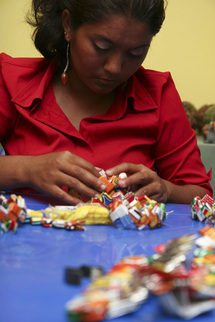Fair Trade

Fair trade exists to ensure that a fair proportion of the retail price of a product is returned to the person who created the commodity in the first place.
While the Fair Trade movement works to provide benefits to artisans and producers around the world, it primarily targets people in low-income countries, where the production process has been exploited by trade agreements that maximize profits for retailers and middle men at the expense of artisans and producers.
Fair Trade reverses the objectives of traditional trade practices and promotes fair wages that encourage the economic independence of the artisan. Artisans who work with Fair Trade organizations frequently receive between a quarter and a third more of the profits than those who are not selling at Fair Trade prices.
In addition to paying fair wages, Fair Trade certified organizations are required to meet the following guidelines in their trade practices. They must:
- Create opportunities for economically disadvantaged producers.
- Develop producers' independence.
- Value and reward the work of women as well as men.
- Create a safe and healthy working environment.
- Respect the UN Convention on the Rights of the Child, and ensure that any child participating in the production of Fair Trade goods is not adversely affected.
- Ensure environmentally sound practices and methods of production.
- Engage in trade practices concerned with the social, economic and environmental well-being of small producers that does not maximize retailer profits at their expense.
Advocate for Fair Trade
The Fair Trade movement is made up of organizations that work with and support producers and artisans, but it is ultimately maintained by consumers who commit to purchasing Fair Trade products.
Since the Fair Trade movement began in the 1940's, participation and awareness has been growing each year. In 2006, consumers worldwide spent more than US$2 billion on Fair Trade Certified Products, a 41% increase over 2005. Europe represents the biggest and fastest growing market, consuming approximately 60-70% of all fairly traded goods.
Fair Trade is undeniably predominantly beneficial for small producers and artisans. But it still represents less than 0.1% of all goods traded internationally, and to make these practices sustainable at a large scale, the movement requires the continued support of Fair Trade organizations, retailers, and buyers.
The Fair Trade movement is giving many individuals and families sufficient resources to be able to lift themselves out of poverty and support themselves for the first time in their lives and it needs your participation.

